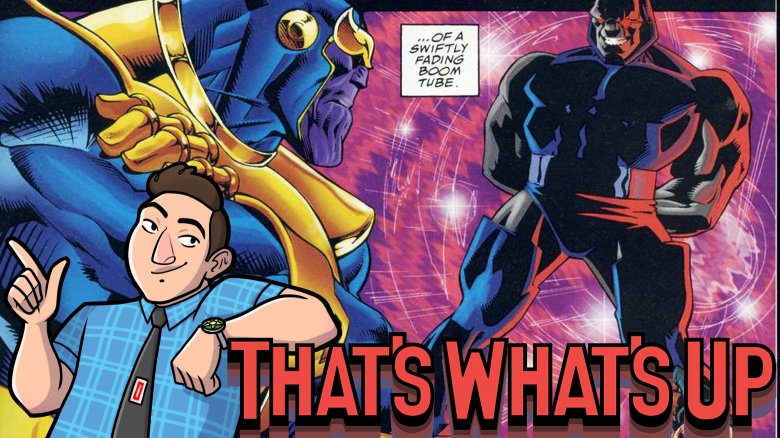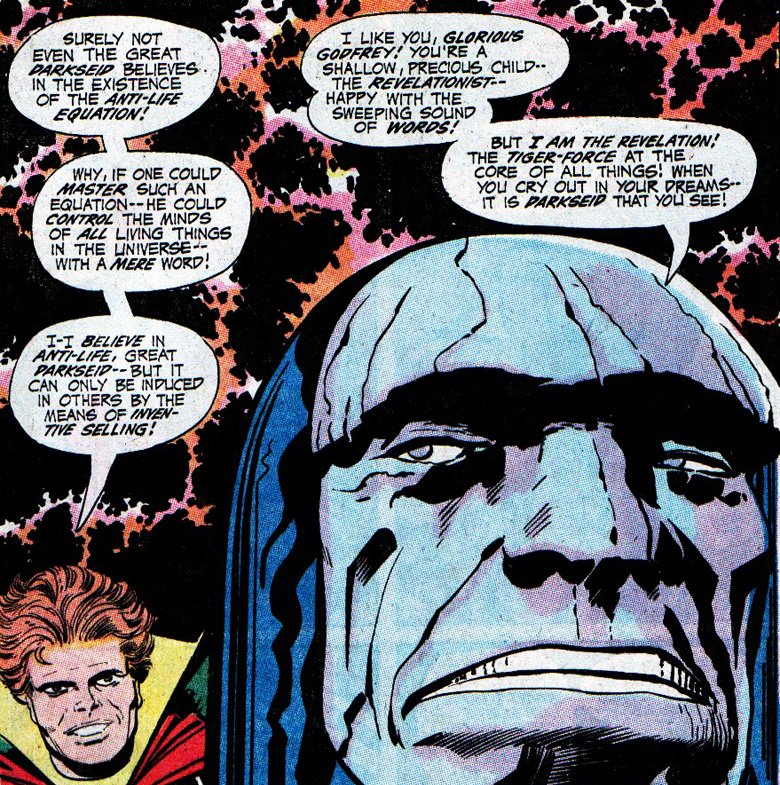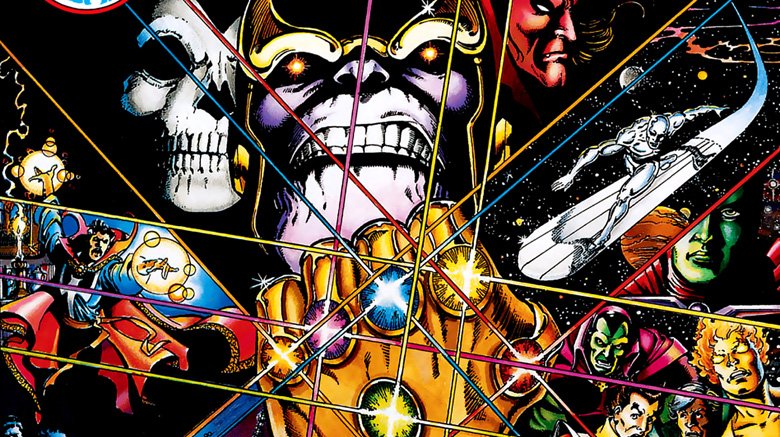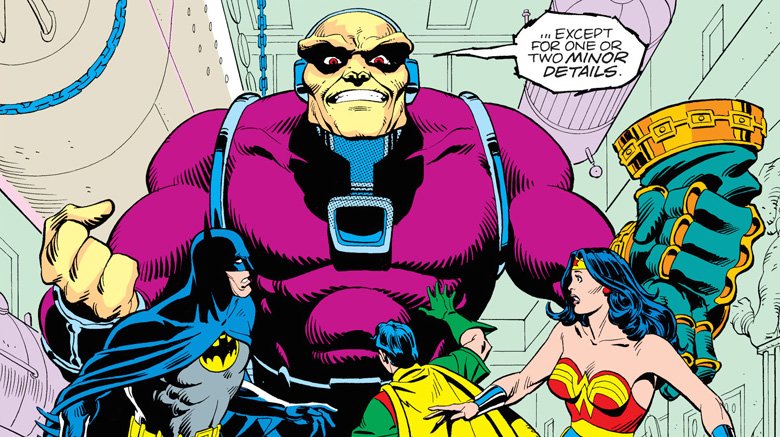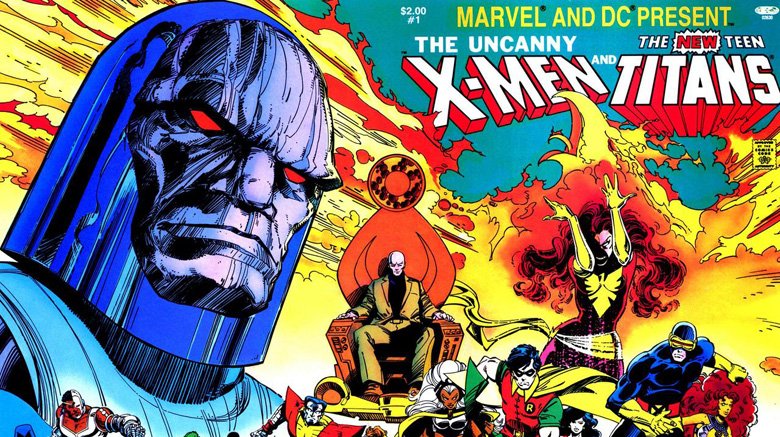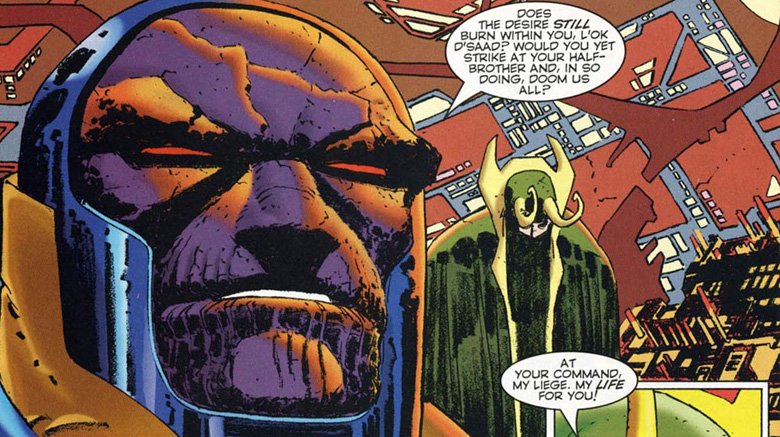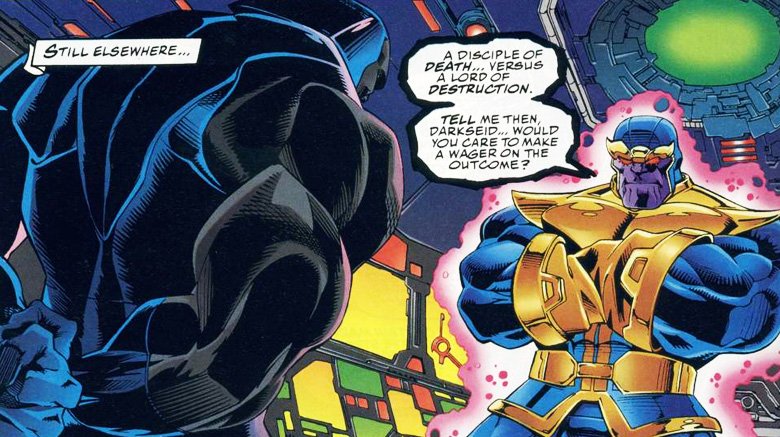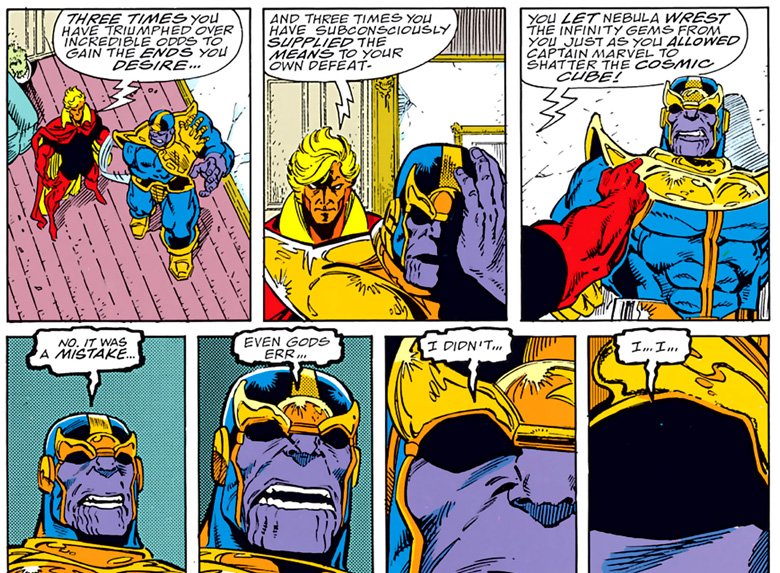That's What's Up: Who Would Win In A Fight: Darkseid Or Thanos?
Each week, comic book writer Chris Sims answers the burning questions you have about the world of comics and pop culture: what's up with that? If you'd like to ask Chris a question, please send it to @theisb on Twitter with the hashtag #WhatsUpChris, or email it to staff@looper.com with the subject line "That's What's Up."
Q: Hey, this seems like something you'd have opinions on: who would win in a fight between Thanos and Darkseid? — via email
That's an easy one, baby! The real winner in a titanic tussle like that would be the fans!
I'm guessing, however, that you're looking for an answer that's a little more thoughtful and a little less hucksterish. For that, my friend, you have come to the right place. As someone who worked in a comic book store for the better part of a decade, I had plenty of "who would win in a fight" conversations on slow Tuesday afternoons, and now that I occasionally have to come up with the answers to make my living, I feel like this is one I can get a handle on. The thing is, though, when it comes to a battle between Darkseid and Thanos, you have to dig a little deeper than just figuring out who can punch hardest and whether the Omega Sanction is more powerful than the Infinity Gauntlet.
The truth is, those characters have kind of been sniping at each other behind the scenes for over four decades.
Tale of the Tape: Darkseid
Most comics readers are probably familiar with Darkseid as the primary antagonist of Jack Kirby's Fourth World saga, and one of the DC Universe's most cosmically powerful, universe-threatening villains. If you're up on your trivia, you probably know that he actually made his first appearance in an issue of Superman's Pal Jimmy Olsen, the book that Kirby took over upon his arrival at DC, after an apocryphal promise to make the company's worst-selling book into their best. There is, however, a slightly less well-known piece of Darkseid's origin story: Kirby's original intention was to unleash him on the Marvel Universe.
It makes sense. He had, after all, been with Marvel since the beginning — both beginnings, in fact, considering that he and Joe Simon kicked off Captain America in 1940 for the company that was then known as Timely, and then he returned to launch the Marvel Age of Comics in 1961 with a writer you might've heard of called Stan Lee. In that time, he had a hand in creating almost all of Marvel's major characters, but he had a particular affection for the blend of sweeping mythology and techno-sci-fi that he injected into Thor. It was while he was working on the Tales of Asgard stories in the late '60s that he came up with the idea of not just threatening the heroes with the world-shattering battle of Ragnarök, but actually going through with it, killing off Thor and the entire pantheon of Asgard and replacing them with a brand new mythology.
Needless to say, that never happened, mostly because killing off some of your most popular characters was a tough sell in comics until the mid-'80s, when it became standard operating procedure. But it did provide the basis for what Kirby would actually do once he left Marvel and got the freedom to create a whole new mythology.
As a result, New Gods #1 kicks off with one of the best opening lines in comics history: "There came a time when the old gods died!" A pretty great hook in its own right, but an interesting shot across the bow that marked a six-year separation of Kirby from the Marvel Universe if you know the story behind it. Look close, and you can even see one of those "old gods" wielding a hammer with a suspiciously familiar helmet on.
Tale of the Tape: Thanos
Only a few years after Darkseid made his first appearance, Jim Starlin decided to add a few new characters to his own mind-blowing cosmic space operas, and wound up creating the biggest bad in the Marvel Universe. The thing is, while he was drawing on classic myths and Freudian psychology — casting his new characters as a pair of space-born brothers named after Eros and Thanatos — he was also pretty heavily inspired by what Kirby had been doing at DC with the Fourth World saga. In effect, he created Marvel's equivalent to what he thought was the most interesting of the New Gods. It just wasn't the one you're thinking of.
Rather than Darkseid, the original inspiration for Thanos was Metron, a New God whose primary goal wasn't the battle of good against evil that concerned the others, but the acquisition of knowledge. As a result, Metron existed as this sort of amoral force, who, while nominally one of the good gods of New Genesis, could have his own sinister motivations and machinations. The twist that was that Starlin shifted that amorality into full-on nihilism, bringing readers a character who didn't believe in anything beyond the unknowable allure of death.
When Starlin brought his ideas to editor Roy Thomas, though, Thomas advised him to take the character in a bit of a different direction, bulking him up to make him a more obvious physical threat — and a closer analogue for Darkseid. As Starlin would later recall in an interview that ran in Comic Book Artist #2, Thomas told him that "if you're going to steal one of the New Gods, at least rip off Darkseid."
Side note: Mongul
Here's where it gets weird. When Starlin went over to DC, he worked with writer Len Wein to create a new character called Mongul: a massively powerful alien warlord who could pose a physical threat to Superman and cruised around space on Warworld, a customized planetoid that was half Death Star, half gladiatorial arena. He's probably most familiar to readers as the villain who trapped Superman in an incredibly depressing dream world on his birthday in Alan Moore and Dave Gibbons' classic "For the Man Who Has Everything," but he's been an on-again/off-again presence in Superman comics for decades. In fact, he always seems to pop up when the heroes need a big-name villain who can pose a believable threat, but not so believable that he can't just be dealt with on the way to finding a real villain to fight.
In other words, DC has Mongul as their version of Marvel's Thanos, who's a take on DC's Darkseid, who was originally conceived as a Marvel character anyway.
With that kind of complicated history of characters being inspired by each other, it's no wonder that readers are inevitably drawn to the idea of seeing them take each other on and debating who'd win in a fight. Creators, on the other hand, always seem to have other plans for who to match Darkseid up against.
Darkseid vs. Everyone But Thanos
Darkseid vs. Thanos seems like the kind of no-brainer matchup that would've happened by now, but we've never really gotten a real answer to this one in the comics themselves, largely because Darkseid ends up fighting against other cosmic threats instead.
In The Uncanny X-Men vs. the New Teen Titans, for instance, the big threat that brought Marvel and DC's most popular books together was a team-up between Darkseid and the Dark Phoenix. That makes sense, too — for one thing, since Darkhawk hadn't been created yet, they were right next to each other in alphabetical order, and for another, harnessing this purely destructive force for his own sinister ends is a very Darkseid thing to do. Darkseid/Galactus: The Hunger, on the other hand, pits Darkseid against... well, you can probably guess from the title. Again, that makes perfect sense, and the idea of Galactus attacking Apokolips and trying to devour the life energy of a planet that's both figuratively and literally dead is a pretty darn good one.
The only time that I can think of when those two characters really come face to face and directly challenged each other came in — what else? — DC vs. Marvel, the 1996 crossover that's mostly known for having some truly dubious results in its match-ups. If you're not familiar with it or weren't obsessively sending in postcards back in the day, the idea was that while some of the battles would be determined by the creators (and the publishers they worked for), a few of the big ones would have their outcomes determined by the fans.
One of the many frustrating things in that crossover, though, was that while Darkseid and Thanos actually did get their long-awaited face-to-face confrontation, they never even got to the part where they had a fight. Instead, something even weirder happened: they were briefly combined into a single person.
Thanoseid: Scourge of the New Asgods!
In one of the most goofy-but-awesome moments in superhero comics history, DC vs. Marvel ended with Marvel and DC deciding to put out a bunch of one-shot stories under the banner of Amalgam Comics, where their characters were all mashed up together into new and incredibly weird forms. Captain America and Superman became Super Soldier, Batman and Wolverine were combined to form Dark Claw, Iron Man and Green Lantern became Iron Lantern, and so on down the line. They're incredibly fun, with each one written in-universe as the rebooted first issue for characters that had been going for years, with a cliffhanger setting up a second issue that, of course, was never going to exist.
With all that in mind, Keith Giffen and John Romita Jr. cooked up Thorion of the New Asgods, mashing up Marvel's Thor and DC's Orion and giving readers what was probably the closest thing to Kirby's original idea for the New Gods springing out of Thor that would ever hit the page. The villain? Thanoseid.
To be fair, he's basically just Purple Darkseid who's slightly more into Death as a love interest rather than just on, you know, a conceptual level, but it's still pretty cool to see. If nothing else, DC vs. Marvel and the Amalgam books felt like the first time Darkseid and Thanos were treated as equals. This was, after all, not too long after Infinity Gauntlet had redefined Thanos as a threat to the entire universe, and Darkseid's popularity was on an upswing, too. He'd never really left and had been featured pretty prominently in both comics and on shows like Super Friends, but only a few years after this, a JLA story called "Rock of Ages" would re-establish him as a truly sinister threat, and give him an ominous catchphrase in the process: "Darkseid is."
And yet, they did all that, and Darkseid and Thanos never actually threw down in a fight. But that brings us back to the question that kicked us off: who would win if they did?
Advantage: Thanos
In terms of pure physical power, I think you have to give the edge to Thanos.
While it's not really supported in the comics, one thing I've always really liked is something that I read once about how Kirby originally planned to end the Fourth World saga. According to his longtime assistant and comics writer Mark Evanier, those characters were never really intended to go on forever, and part of that initial plan was to reveal Darkseid as being significantly weaker than he originally appeared. The New Gods were operating on a metaphorical level even by superhero standards, and Darkseid was meant to be the living embodiment of capital-E Evil. As Kirby had shown time and time again in those stories, though, Good and Evil weren't evenly matched forces. While Darkseid's brand of evil was insidious and preyed on our worst impulses of hatred and fear of ourselves and each other, it was never as strong as Good.
As I understand it — and I admit that I might have this wrong — the original plan was to reveal that in the final confrontation, with Darkseid, despite all his grandeur and bravado about being the Tiger-Force at the center of all things, being shown to be ultimately weak and cowardly. That's an idea that I love for its philosophy, but unfortunately, Darkseid was a victim of his own success on that front. Instead of getting that morally instructive ending, he was popular enough to stick around for the next five decades, with the kind of power to match his status in the DC Universe.
Thanos, meanwhile, doesn't have that same kind of philosophical underpinning to him. That's not a knock on the character — there's plenty of really interesting and thoughtful stuff involved, especially given the end of Infinity Gauntlet and his attempts to move past his own driving obsession with death — but from day one, it's never been about a lack of power with Thanos. He's always been capable of incredible, unstoppable acts of violence. As he puts it in Infinity Gauntlet, "my every moment is spent in either dealing out death or worshipping it."
That is, by any standard, a bad dude. Even matched up against Darkseid at his strongest, and even if Thanos had to wade through an entire army of Darkseid's parademons (which, to be honest, is something even Aquaman rarely has trouble with), it's hard to imagine that he wouldn't have the advantage in a straight up physical confrontation.
There's just one problem. Thanos has a weakness, and that weakness is Darkseid.
The dark side of Thanos
The thing that makes Thanos such an interesting character is that he has a massive flaw: his own self-destructive nature. Consciously or not, he doubts himself and his worthiness, and sets himself up for failure. And that's exactly the kind of flaw that Darkseid is made to exploit.
The idea is right there in the name: Darkseid is less about being a physically powerful craggy rock monster from space, and much more about preying on and nurturing the dark side of our own selves. Thanos is no exception to that — he might even be especially vulnerable to it, given that his defining moments are all about being driven by his own all-consuming obsession with death. It's doubt, fear, and hate that sit at the core of his personality, the hatred of himself for failing to achieve his goals, and the doubt that he can ever actually be worthy of accomplishing them in the first place. Like another great supervillain, Dr. Doom, he's very rarely defeated purely by being outmatched, but because those flaws lead him to set himself up for the inevitability of his defeat.
That makes him uniquely easy for Darkseid to manipulate, and really, that's all it would take. I mean, there's a lot more to winning a battle than just coming out ahead in a fistfight, but it's easy to argue that Thanos loses the second he decides to fight Darkseid at all. The only way to truly win is to reject that part of himself and move past his desire to conflict — and even that means accepting the loss.
And that's what's beautiful about those two characters. The way that they've influenced each other over the years has meant that when you think about the way they interact, there's a reflection and a response there that goes well beyond the usual bullet points that you get with other "who could win in a fight" arguments. With Darkseid and Thanos, it's all about character work. It's one of those rare matchups that makes them both more interesting when you think about them, and shows just how rewarding characters can be when these ideas weave their way through great creators and great stories.
Oh, and also Darkseid can shoot beams out of his eyes that follow you around corners and can vaporize you or send you back to cowboy times, and Thanos can't. I mean, that seems like the dealbreaker, right?
Each week, comic book writer Chris Sims answers the burning questions you have about the world of comics and pop culture: what's up with that? If you'd like to ask Chris a question, please send it to @theisb on Twitter with the hashtag #WhatsUpChris, or email it to staff@looper.com with the subject line "That's What's Up."
